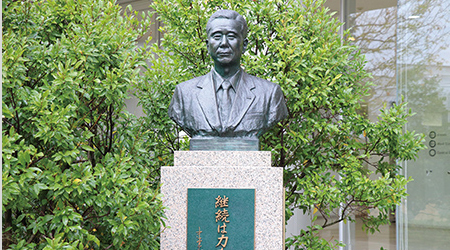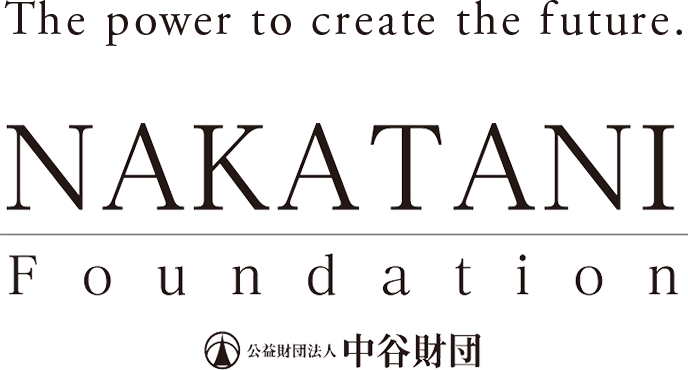


About Nakatani Foundation.

The Nakatani Foundation was established in 1984 by the late Taro Nakatani, founder of Sysmex Corporation, with his private fortune.
The Nakatani Foundation has been committed to the advancement of measuring technologies in biomedical engineering, and has worked to foster young human resources and expand the range of researchers by providing research grants, including awards and long-term large-scale research grants, as well as exchange programs, scholarships for graduate students, support for short-term study abroad for university students, and promotion of science education for elementary and junior high school students.
In 2024, the 40th anniversary of the foundation's establishment, we have expanded our grant programs to the field of BME (Biomedical Engineering) and established a new award program, the "Kobe Prize."
Message
The Future Is Built on Nurture and Contribution
The Nakatani Foundation is engaged in awards and grants to promote biomedical engineering measurement technologies. Our approach is to offer awards and grants continuously while making the most necessary contributions based on our understanding of “the needs of today’s society.” Through our daily activities, including making social contributions, we believe that we can develop “the power to create the future” and realize people’s happiness through the innovation of biomedical engineering technologies.
Message from the Representative Director
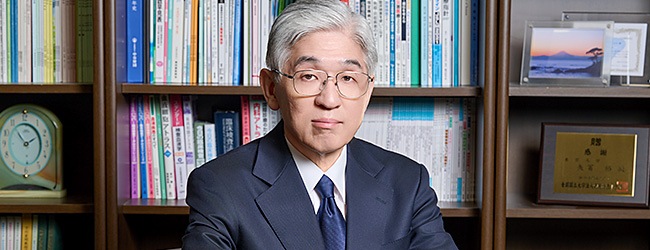 Yutaka Yatomi Representative director
Yutaka Yatomi Representative director
The Future Is Built on Nurture and Contribution
The Nakatani Foundation is engaged in awards and grants to promote biomedical engineering measurement technologies. Our approach is to offer awards and grants continuously while making the most necessary contributions based on our understanding of “the needs of today’s society.” Through our daily activities, including making social contributions, we believe that we can develop “the power to create the future” and realize people’s happiness through the innovation of biomedical engineering technologies.
The Nakatani Award is given to researchers who have made outstanding achievements in the field of biomedical engineering measurement technologies. The purposes of the award are to commend the research achievement, to inform the world about the latest status of biomedical engineering measurement technologies, and to further accelerate the development of these technologies.
Since the establishment of the Nakatani Foundations, its grant programs have been run and expanded from time to time by many people, including its founder, Taro Nakatani. This task carries a lot of expectations. We strongly believe that we will need more outstanding researchers and scientists in the future. To nurture excellent researchers and scientists, it is crucial to encourage scientific thinking from childhood, help them develop the ability to understand global needs and to improve the technologies by leveraging their own global and interdisciplinary networks. We have identified the needs of the scientific environments in various stages, from elementary school to the front-end laboratories of universities and public institutes. Based on these, we design and provide a wide range of support for students and young researchers to encourage and motivate them to become scientists and/or to achieve their goals. We believe this shall be the right approach for us to promote the development of biomedical measuring technologies.
We are also working to return research outcomes to society and initiate possible collaboration so that we can respond flexibly to the real world’s needs. We believe such activities will build up a place of creativity where new ideas and further exploration can freely come out. We think it is nothing short of “the power to create the future” itself.
While our primary goal is to promote the growth and development of biomedical engineering measurement technologies, we believe that society cannot develop without the growth of people. The Foundation, as a whole, commits to contribute to the development of society and human beings and expects we can help to build a collaboration for a bright future.
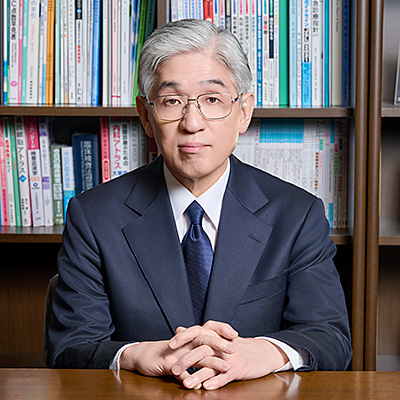 Yutaka Yatomi Representative director
Yutaka Yatomi Representative directorProfile
Name: Nakatani Foundation for advancement of measuring technologies in biomedical engineering.
Establishment: The “Nakatani Electronic Measuring Technology Association of Japan” was established in 1984. By expanding activities, Nakatani Foundation was started as the public interest incorporated foundation in 2012.
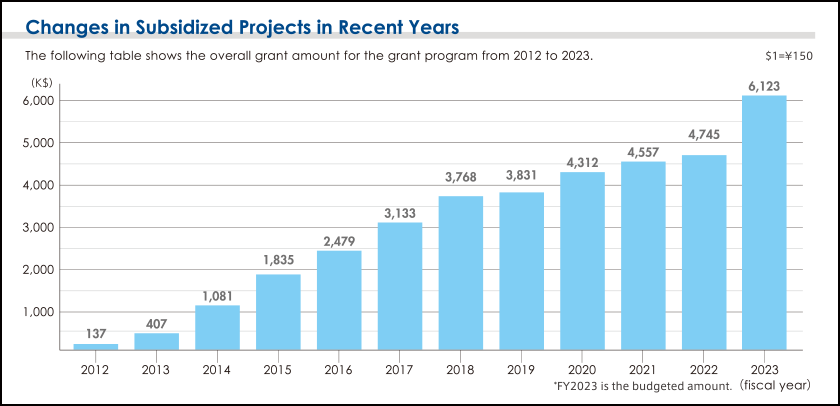
Programs
- Outlook
- Technology Exchanges
- Grant Program forGlobal Research Internship
Award Program
The Nakatani Foundation Award is presented to researchers who have achieved remarkable results. It is the top award given in the field of biomedical engineering measuring technologies.
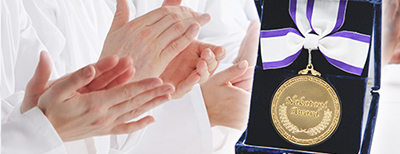
Grant Programs
The grant programs, which are at the core of the foundation, provide a wide range of support, from advanced research in biomedical engineering to the development of children’s scientific interest. The Nakatani Foundation also focuses on nurturing the talents of primary and secondary school students, undergraduates, and graduates who will lead biomedical engineering’s future. There are six grant programs. The first three grants below are mainly for researchers, and the last three are for students.
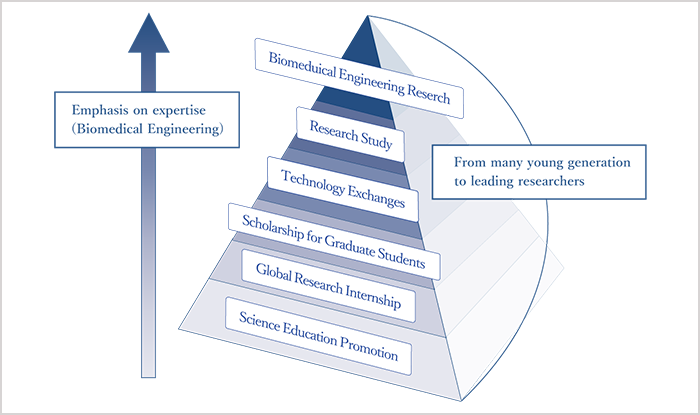
Grant Program for Biomedical Engineering Research: Assists researchers in conducting new development research; provides grants for two-year or five-year large-scale research, for example.
Grant Program for Research Study: Supports the study of technological trends and other issues concerning biomedical engineering measuring technologies.
Grant Program for Technology Exchanges: Supports sending researchers abroad for training and research and inviting researchers from overseas to Japan.
Scholarship for Graduate Students: Supports graduate students seeking doctoral degrees in biomedical engineering.
Grant Program for Global Research Internship: Provides research and cultural experiences to undergraduate STEM students in Japan and abroad.
Grant Program for Science Education Promotion: Provides opportunities to awaken the scientific interests of students in primary and secondary schools.
The Nakatani Foundation carries out the following 4 grant programs to support Japanese and overseas researchers as they collaborate and contribute to the development of biomedical engineering measuring technologies and related technologies. Here, technologies are broad, including techniques based on not only physics, chemistry, and biology but also mathematical analysis, simulation, data science, and others.
Dispatch Overseas: Subsidizes part of the expenses for researchers (including graduates) and engineers in Japan who attend, give research presentations, and exchange views with foreign experts at international conferences and workshops held overseas.
Invitation to Japan: Subsidizes part of the expenses for overseas researchers and engineers who are invited to conferences, workshops, and technological meetings held in Japan and who exchange views with Japanese experts. As a general rule, expenses for travel and hotel are covered. The duration of stay in Japan is one week or less.
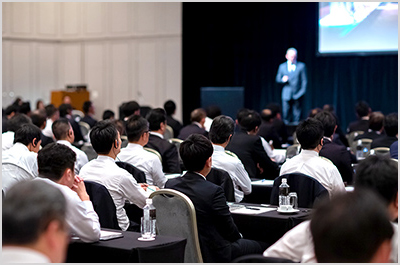
Studying Overseas: Subsidizes part of the expenses for Japanese researchers (including graduates) and engineers who study at foreign universities and research institutes at their own cost. The Nakatani Foundation offers 2 types of programs: “short-term” from 1 month to 11 months and “long-term” from 1 year to 3 years.
Studying in Japan: Subsidizes part of the expenses during the stay for foreign researchers (including graduates) and engineers who study at Japanese universities and research institutes at their own cost. As a general rule, Nakatani offers JPY 200,000 per month for a maximum of two years. The duration of stay must be one year or longer. Researchers and engineers who belong or will belong to a Japanese university or research institute and who are under 40 years old are eligible to apply.
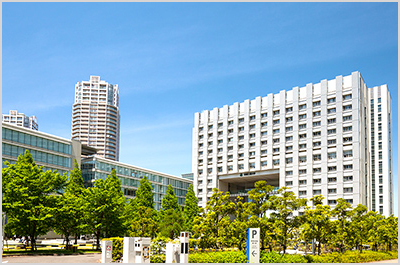
Applications: The Nakatani Foundation accepts applications from all four technology exchange programs from professors or researchers at Japanese universities or research institutes. Those who are interested in the programs are encouraged to contact their counterparts in Japanese universities or research institutes. Details are provided in the Nakatani Foundation Japanese Home Page.
The Nakatani Foundation carries out grant programs for undergraduate STEM students to experience leading-edge technology research at overseas universities.
The Nakatani Foundation encourages students who wish to be researchers or engineers to participate the program so that they can experience the international research environment and leading-edge research. In addition, the program provides opportunities to meet local people such as students, lab members, and professors, allowing them to build up an international network.
The global research internship consists of two programs. One is Nakatani RIES (Research & International Experiences for Students) in summer, and the other is ARIP (Advanced Research Internship Program) in Spring. While the current program is between the U.S. and Japan, the Nakatani Foundation expects to expand it to involve European countries in the future.
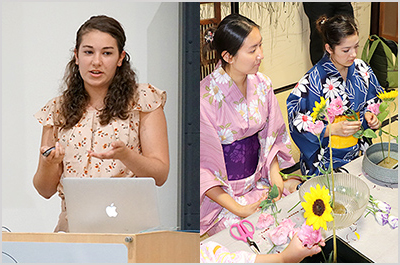
Nakatani RIES
The program will send approximately 10 Japanese undergraduate STEM students to universities overseas for five to six weeks starting in August and about 10 foreign STEM undergraduates to host laboratories at Japanese universities for 10 weeks starting in May. The Nakatani Foundation launched the program in 2016. From 2016 to 2019, 38 U.S. and 12 German undergraduate students had visited Japan and conducted their research at top universities in the country; 31 Japanese undergraduate students were sent to the U.S. and 12 to Germany.
In October 2019, to carry out the Nakatani RIES program as a partnership from 2020, Georgia Insititute of Technology and the Nakatani Foundation signed the agreement for the Nakatani RIES Fellowship program.
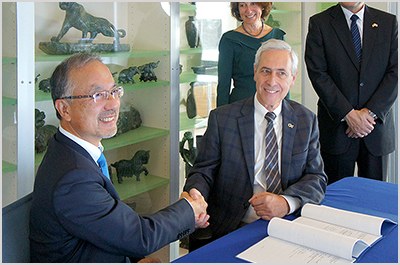
Under the renewed RIES program, the Nakatani Foundation selects about 10 Japanese undergraduate students. Then it sends them to the Wallace H. Coulter Department of Biomedical Engineering at Georgia Tech and Emory University. About 10 Georgia Tech biomedical engineering undergraduate students have an opportunity to visit Japan to conduct leading-edge research at Japanese University laboratories for about ten weeks after a one-week Japanese culture/language class in Japan.
For more details about the RIES program for U.S. undergraduates, please visit Georgia Tech’s home page.
ARIP(Advanced research internship program)
The Nakatani Foundation selects approximately four Japanese undergraduate students who have completed the Nakatani RIES program over the summer. Each selected student will conduct further research at a laboratory. Students will choose from laboratories that have agreed with the Nakatani Foundation to accept them. The laboratories at Georgia Institute of Technology (Bio), University of California Davis (Bio), and Harvard University (Physics) are currently accepting ARIP students. Each student will conduct advanced research for about two months.
ARIP students are expected to have an in-depth understanding of research itself, careers as a researcher, the daily life of a researcher, and a smaller and more connected global world.
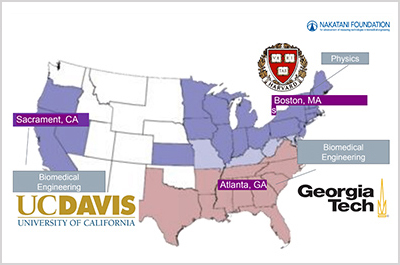
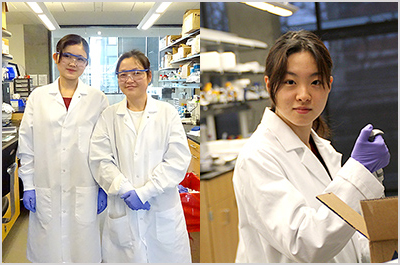
Others
FAQ
Overall
-
Q
What does the Nakatani Foundation do outside of Japan?
AThe Nakatani Foundation wants to contribute to the development of biomedical engineering measurement technologies and nurturing human resources globally. However, what it can do is limited because it is a Japan-based public interest incorporated foundation. At this moment, the Technology Exchange Program and Global Research Internship Program are, with certain limitations, global programs.
Technology Exchange
-
Q
Who can apply?
AThe applicant must be a researcher/professor at a Japanese Research Institute/University. If you are abroad and interested in the technology exchange program, please contact your counterpart in Japan and request that he/she apply for the program on your behalf.
-
Q
How will I get my money for travel, accommodations, and so forth?
AIn the case of “Invitation to Japan,” the Nakatani Foundation will transfer the grant to an applicant who arranges your visit to Japan; for example, he or she may arrange your air ticket.
In the case of “Studying in Japan,” you will need to open a Japanese bank account once you arrive in Japan. Then, the Nakatani Foundation will transfer your grant to your account in Japanese YEN. -
Q
Can I use a business-class flight?
AYou will receive the fee for a major airline’s economy class or similar.
Global Research Internship
-
Q
Who can apply?
AThe Nakatani Foundation offers the Nakatani RIES program through the Georgia Institute of Technology. At this moment, only Georgia Institute of Technology undergraduates can submit an application. For details, please refer to the university’s website.
The ARIP (advanced research internship program) is for Japanese students only.
Contact Us
If you have more questions, contact us


